2016级初三英语第二次月考试题
- 格式:doc
- 大小:75.00 KB
- 文档页数:11
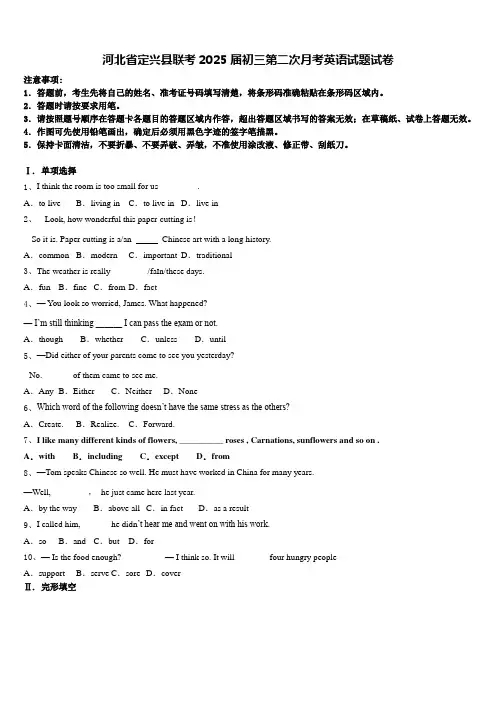
河北省定兴县联考2025届初三第二次月考英语试题试卷注意事项:1.答题前,考生先将自己的姓名、准考证号码填写清楚,将条形码准确粘贴在条形码区域内。
2.答题时请按要求用笔。
3.请按照题号顺序在答题卡各题目的答题区域内作答,超出答题区域书写的答案无效;在草稿纸、试卷上答题无效。
4.作图可先使用铅笔画出,确定后必须用黑色字迹的签字笔描黑。
5.保持卡面清洁,不要折暴、不要弄破、弄皱,不准使用涂改液、修正带、刮纸刀。
Ⅰ. 单项选择1、I think the room is too small for us ________ .A.to live B.living in C.to live in D.live in2、-- Look, how wonderful this paper-cutting is!-- So it is. Paper cutting is a/an Chinese art with a long history.A.common B.modern C.important D.traditional3、The weather is really ________/faɪn/these days.A.fun B.fine C.from D.fact4、— You look so worried, James. What happened?—I’m still thinking ______ I can pass the exam or not.A.though B.whether C.unless D.until5、—Did either of your parents come to see you yesterday?--No. ______ of them came to see me.A.Any B.Either C.Neither D.None6、Which word of the following doesn’t have the same stress as the others?A.Create. B.Realize. C.Forward.7、I like many different kinds of flowers, __________ roses , Carnations, sunflowers and so on .A.with B.including C.except D.from8、—Tom speaks Chinese so well. He must have worked in China for many years.—Well, ________,he just came here last year.A.by the way B.above all C.in fact D.as a result9、I called him, ______ he didn’t hear me and went on with his work.A.so B.and C.but D.for10、— Is the food enough? — I think so. It will _______ four hungry peopleA.support B.serve C.sore D.coverⅡ. 完形填空11、My mum lives alone and works at a hotel. One day on her way home from work, she saw a cat. It was very small and had white and black hair. At first, she just walked by 1 because it was a really windy afternoon. But the cat followed my mum a long way.It looked very hungry and 2 . At last it walked into my mum’s heart and life.Last Sunday, I went to visit my mum. She told me excitedly about her little cat. I saw it for the first time. The cat wasn’t afraid of me at all. When I called its name, it looked at me with its big eyes and said “meow” to me, and then wa lked over slowly. It was so cute that I 3 it immediately.This cat makes my mum smile. She is always happy with the cat around. The cat will stay in the room 4 it feels cold or just doesn’t want to be outside. My mum loves it and always tries t o make it feel 5 . The cat loves my mum too. It must think of my mum as 6 mum. It is really attached to(依恋)her. It makes her heart full of love and happiness. It makes me happy too, because I love to see the smile on my mum’s face.1.A.quickly B.early C.loudly D.happily2.A.cold B.boring C.busy D.interesting3.A.minded B.loved C.chose D.found4.A.before B.so C.if D.but5.A.sorry B.healthy C.funny D.comfortable6.A.its B.it’s C.it D.itselfⅢ. 语法填空12、阅读下面材料,在空白处填入适当的内容(1个单词)或括号内单词的正确形式(不超过2个单词)Many people catch a cold in the spring or fall. It makes us wonder: since scientists c an send a man to the moon, why can’t they find a treatment for the common cold? The question is easy 1.(answer)----there are hundreds of kinds of cold viruses(病毒) out there. You never know 2.one you’ll get, so there isn’t a treatment for each one.When a cold virus 3.(try) to hurt your body, your body will work hard to fight against it. Blood rushes to your nose and brings congestion(堵塞) with it. This makes you feel terrible because you can’t breathe comfortably, but actually, your body 4.(eat) the virus. Your body temperature rises and you get a fever, but the heat of your body is killing the virus. You also have a runny (流鼻涕的) nose to stop the virus 5.(get) close to the cells(细胞). And as a 6., your body may be very painful. But it is actually doing everything it can to get a victory over the cold.Different people have different ways to 7.with colds. Some have chicken soup to feel better, some take hot baths, and many other people take medicine. However, some scientists say that taking medicine when you have a cold is actually 8.to health. The virus stays in your body even longer because your body can’t do it’s 9.to fight with it and kill it. Bodies can do an amazing job on their own. There’s a joke about taking medicine when you have a cold. It 10.(go) like this.It takes about 1 week to get over a cold if you don’t take medicine, but only 7 days to get over a cold if you take medicine.Ⅳ. 阅读理解A13、Today’s world is full of plastic goods, from water bottles to car parts. We make plastic toys, too thbrushes, and shopping bags. Plastic is so useful that it’s hard to imagine life without it, but it has not been around that long.The first plastic was invented in 1869. That’s when American John Wesley Hyatt made a form of plastic from a plant material called cellulose. Before long, his discovery was used to make combs, eyeglasses, buttons, and film.In the 1900s, petroleum products such as oil replaced cellulose. New kinds of plastic were discovered in the 1950s, and that’s when the real boom began. Peo ple started to use plastic in many fields instead of the old materials. Plastics quickly replace paper, glass, metal, and wood in a growing number of products. In 1960, the United States made 6 billion pounds of plastic. By 1988, the output had grown to 50 billion pounds. These days, almost 10 percent of the oil America uses every year is turned into plastic. That’s 2 million barrels of oil a day.Most of the plastic ever made still exists. Unlike wood, metal, and paper, plastic does not break down easily. Some people think plastic will never break down. Others say it may take 500 or 1,000 years. No one knows for sure because it has been around for too short a time. But if George Washington had used plastic water bottles in the 1700s, those bottles would probably still be around.Although plastic lasts a long time, we don’t keep plastic products very long. We use them and throw them away. Only about 5 percent of plastic is recycled. A huge amount of it ends up floating in the ocean. Then seabirds, seals, turtles, whales and fish eat it. Scientists often find sea animals that have starved(饿)to death with their stomachs full of plastic. And every time it rains, more trash from city streets flushes into the sea. Much of that trash is plastic.What can we do about plastic? First, be aware. Oil takes millions of years to form. Should we use up this precious fuel to make flimsy shopping bags that are used once and thrown away? Should any animal pay for our convenience with its life? Each person’s actions can make a difference. It’s time to act now.1.What can we know about plastic?A.Plastic is now widely used in every area of our daily life.B.America holds the leading position in the world-wide use of plastic.C.Plastic can last for more than 300 years and will never break down.D.About 95% of plastic is used once and then thrown away.2.Which detail supports the idea that plastic can be dangerous?A.Animals starve to death after eating plastic.B.Much of that trash is plastic.C.About 10 percent of the oil we use every year is made into plastic.D.John Wesley Hyatt made the first plastic from cellulose.3.The underlined word “replace” in paragraph 3 means “______”.A.Take the charge of B.Increase in value C.Take the place of D.Decrease in value4.What might be written in the following paragraph?A.Reasons about why we should use less plastic.B.Criticism on those who make and buy plastic.C.Tips for using plastic in the environmental friendly way.D.Difference between using plastic and other materials.5.What’s the best title of the passage?A.Amazing Plastic. B.Dangerous Plastic. C.Useless Plastic. D.New PlasticB14、Mobile phone has become a problem for middle schools. Some middle schools in Australia have banned (禁止) students from carrying mobile phones during school hours.Mobile phone use among children has become a problem for schools. Several children have got mobile phones from parents and friends as Christmas gifts, and more students will want them.Lucy Bluett, an expert, said mobile phone use was a distraction (分心的事) to students during school hours. Teachers were also saying that sometimes students might use phone messages tocheatduring exams.She said some schools had tried to ban mobile phones. Some parents felt unhappy because they couldn’t call up their children. Many teachers said students should not have mobile phones at school, but if there was a good reason, they could leave their phones at school office.Many people say that they understand why parents would want their children to have phones, but they think schools should let the students know when they can use their mobile phones.1.Some middle schools in Australia have banned students from carrying mobile phones ______.A.when they are at homeB.when they are freeC.when they are at school2.We know from the passage that some children get mobile phones from .A.the makers and sellersB.the passers-by and strangersC.their parents and friends3.What does the underlined word “cheat” mean in the passage?A.Behave dishonestly.B.Behave honestly.C.Behave correctly.4.Some parents felt unhappy because they couldn’t ______ during scho ol hours.A.use their mobile phonesB.call up their childrenC.help the teachers with their work5.The passage tells us that ______.A.students shouldn’t have mobile phones at school except for some special reasonsB.many people can’t understand why parent s would want their children to have phonesC.all parents felt unhappy because they couldn’t use their phones at schoolC15、After shaking the east coast of Honshu, Japan on March 11, the earthquake has caused more than 10, 000 deaths and 17, 000 people missing. In downtown of Tokyo, buildings shook and frightened citizen blocked out all the streets and roads. The tsunami(飓风)afterwards, which caused more deaths and injury, made Japanese people unable to cheer up. “Now that our neighbors are in trouble,” the Foreign Ministry spokesman said, “we are in our turn to give a hand. Our rescue team has already got there in time to help.” The terrible earthquake also caused a big fire breaking out at the Fukushima nuclear power plant(福岛核电站), leading to a radiation leaking(泄漏).50 nuclear workers, facing radiation and fire, became the only people remaining at the Fukushima nuclear power plant on Tuesday —and perhaps Japan’s last chance of preventing a broader nuclear danger. They have volunteered to put seawater on dangerous nuclear fuel(核燃料)to cool it down, to prevent thousands of tons of radioactive dust high into the air. Some scientists suggest that the leaking is harmful to human being and may influence human body through rain or snow from the sky in the future.1.The earthquake in Japan has caused over ______ people missing.A.10, 000 B.17, 000 C.27, 0002.From the passage, we know that ______ led to a radiation leaking.A.the earthquake B.the tsunami C.the rain3.______ the nuclear fuel can prevent radioactive dust high into the air.A.Throwing away B.Burning out C.Cooling down4.Some scientists suggest Japanese people watch out for _______.A.the fire B.the weather C.the seawater5.The main idea of this passage is that ______.A.Japan is the most dangerous country in the worldB.a big fire broke out at the Fukushima power plantC.the earthquake in Japan led to a radiation leakingD16、Yesterday the police were joined by more than 20 volunteers in the continuing search for the two missing teenagers, Vicky Gray and Tom Hunter, and their guide, Gavin Jones. The police said that they had disappeared during an adventure tour of Cape York Peninsula.This was the second day of the search and the police were now very worried about the safety of the three missing people.The police said that the search had covered a wide area, but the rain forest was thick and their work was made harder by the recent rain. Later on Chief Inspector (警官) Roger Fleet said, “The travellers had a radio with them. If they had been in trouble, they would have called us.”The three travellers left Cooktown very early on Saturday morning in a Toyota car. They took a small dirt road that runs down to the Daintree River, a dangerous river full of crocodiles (鳄鱼). Chief Inspector Roger Fleet said the tourists wouldn’t have got into trouble if they had stayed on the main road.A photo of Vicky and Tom was found by a policeman under the “Be Careful about crocodiles” sign near the river. Why was the photo left behind? This is just one of the unanswered questions. Other questions are: Why was the photo left behind? Why wasthe Toyota parked and locked at the edge of the rain forest? The police said that the travellers had left a map of the area behind. Why? Why had someone drawn a cross on the point where the car is? Is this a sign? What does it mean? If anyone can give information or has seen these three young people, contact the local police in Cooktown.1.This article is probably taken from ___________A.a newspaper B.a magazine C.a storybook2.Which word best describes the search of the three missing people?A.Helpless B.Hard C.Successful3.Which of the following things wasn’t found by the police?A.A touring map. B.A photo of the travellers. C.The travellers’ radio.4.All the following are unanswered questions except_____________.A.why they left a photo behindB.why they came to this areaC.why their Toyota was parked in the place5.The article asks people to _____________.A.join the police in searching for the missing peopleB.tel l the police about the travellers’ ages and their appearanceC.provide information about the missing peopleE17、阅读下列短文,从每题所给的选项中选出最佳答案。
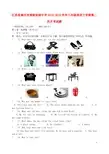
江苏省泰兴市南新初级中学2015-2016学年八年级英语下学期第二次月考试题(考试时间:120分钟满分150分)第Ⅰ卷选择题(共85分)一、听力(20分)第一部分:听对话回答问题。
本部分共10小题,每小题你将听到一段对话,听两遍。
( )1. What does the woman get for her birthday?A. B. C.( )2. What competition does Simon think Kitty should enter for?A. B. C.( )3. Where is the cat?A. B. C.( )4. What are they talking about?A. B. C.( )5. Why was the woman’s train late?A. The train was too full.B. The train broke down on the way.C. It was raining heavily.( )6. What was the best thing the man did in New York?A. He did lots of shopping.B. He visited the Statue of Liberty.C. He met some friends.( )7. What does the boy think the cloud looks like?A. A giant panda.B. An elephant.C. A whale.( )8. How long does the film last?A. One hour and forty-five minutes.B. On hour and a quarter.C. One hour and a half.( )9. Who is that boy?A. Amy’s friend.B. Amy’s brother.C. Amy’s neighbour.( )10. What is Eddie doing?A. He is having a meeting.B. He is working on the project.C. He is repairingthe computer.第二部分:听对话和短文答题。
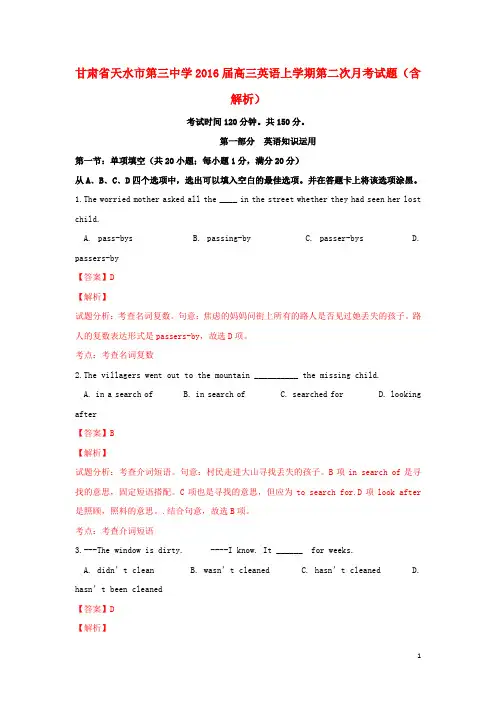
甘肃省天水市第三中学2016届高三英语上学期第二次月考试题(含解析)考试时间120分钟。
共150分。
第一部分英语知识运用第一节:单项填空(共20小题;每小题1分,满分20分)从A﹑B﹑C﹑D四个选项中,选出可以填入空白的最佳选项。
并在答题卡上将该选项涂黑。
1.The worried mother asked all the ____ in the street whether they had seen her lost child.A. pass-bysB. passing-byC. passer-bysD. passers-by【答案】D【解析】试题分析:考查名词复数。
句意:焦虑的妈妈问街上所有的路人是否见过她丢失的孩子。
路人的复数表达形式是passers-by,故选D项。
考点:考查名词复数2.The villagers went out to the mountain __________ the missing child.A. in a search ofB. in search ofC. searched forD. looking after【答案】B【解析】试题分析:考查介词短语。
句意:村民走进大山寻找丢失的孩子。
B项in search of是寻找的意思,固定短语搭配。
C项也是寻找的意思,但应为to search for.D项look after 是照顾,照料的意思。
.结合句意,故选B项。
考点:考查介词短语3.---The window is dirty. ----I know. It ______ for weeks.A. didn’t cleanB. wasn’t cleanedC. hasn’t cleanedD. hasn’t been cleaned【答案】D【解析】试题分析:考查动词时态。
句意:-窗户脏了。
-我知道。
它已经好几周没被清理了。
根据句意,可知是现在完成时。
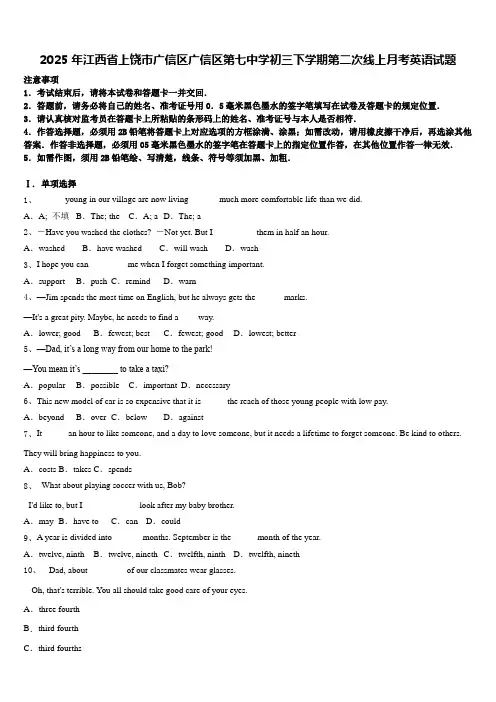
2025年江西省上饶市广信区广信区第七中学初三下学期第二次线上月考英语试题注意事项1.考试结束后,请将本试卷和答题卡一并交回.2.答题前,请务必将自己的姓名、准考证号用0.5毫米黑色墨水的签字笔填写在试卷及答题卡的规定位置.3.请认真核对监考员在答题卡上所粘贴的条形码上的姓名、准考证号与本人是否相符.4.作答选择题,必须用2B铅笔将答题卡上对应选项的方框涂满、涂黑;如需改动,请用橡皮擦干净后,再选涂其他答案.作答非选择题,必须用05毫米黑色墨水的签字笔在答题卡上的指定位置作答,在其他位置作答一律无效.5.如需作图,须用2B铅笔绘、写清楚,线条、符号等须加黑、加粗.Ⅰ. 单项选择1、______ young in our village are now living ______ much more comfortable life than we did.A.A; 不填B.The; the C.A; a D.The; a2、-Have you washed the clothes? -Not yet. But I _________ them in half an hour.A.washed B.have washed C.will wash D.wash3、I hope you can ________ me when I forget something important.A.support B.push C.remind D.warn4、—Jim spends the most time on English, but he always gets the ______marks.—It's a great pity. Maybe, he needs to find a ____way.A.lower; good B.fewest; best C.fewest; good D.lowest; better5、—Dad, it’s a long way from our home to the park!—You mean it’s ________ to take a taxi?A.popular B.possible C.important D.necessary6、This new model of car is so expensive that it is _____ the reach of those young people with low pay.A.beyond B.over C.below D.against7、It _____ an hour to like someone, and a day to love someone, but it needs a lifetime to forget someone. Be kind to others. They will bring happiness to you.A.costs B.takes C.spends8、- What about playing soccer with us, Bob?- I'd like to, but I ____________ look after my baby brother.A.may B.have to C.can D.could9、A year is divided into ______ months. September is the _____ month of the year.A.twelve, ninth B.twelve, nineth C.twelfth, ninth D.twelfth, nineth10、-- Dad, about ________ of our classmates wear glasses.-- Oh, that's terrible. You all should take good care of your eyes.A.three fourthB.third fourthD.three quartersⅡ. 完形填空11、Do you love dogs? Do you like to watch 1 shows? Dog owners (主人) in America have a fashion (时装) show 2 their dogs in the Times Square in New York. It is wonderful and 3 .It's not easy to 4 dogs. The dog owners must know 5 dogs very well. 6 , they must learn about the forms of the dogs' bodies, their colours and what they like and 7 Then, the dog owners design and make clothes for their dogs. The well-dressed dogs 8 on the catwalk (展台). Some of them are really smart, and some are interesting. At last, an 9 dog gets first prize. It looks 10 a taxi. People all think it is the best one.1.A.film B.taxi C.talk D.fashion2.A.for B.on C.to D.at3.A.tired B.interesting C.sad D.free4.A.put B.love C.dress D.wear5.A.our B.their C.your D.my6.A.First B.Second C.Third D.Last7.A.like B.dislike C.love D.enjoy8.A.walk B.sleep C.swim D.look9.A.Chinese B.Japanese C.English D.French10.A.like B.between C.for D.ofⅢ. 语法填空12、根据下面短文内容,在短文的空格处填上一个恰当的词,使短文完整、通顺。
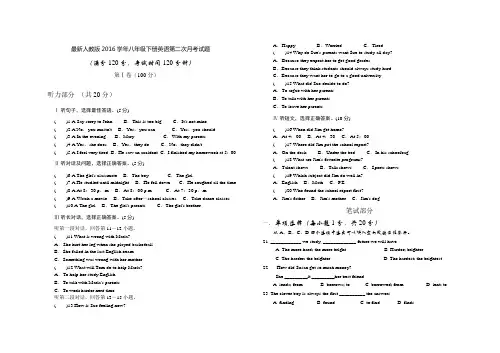
最新人教版2016学年八年级下册英语第二次月考试题(满分120分,考试时间120分钟)第Ⅰ卷(100分)听力部分(共20分)Ⅰ.听句子,选择最佳答语。
(5分)()1.A.Say sorry to John.B.This is too big. C.It's not mine.()2.A.No,you mustn't. B.Yes,you can. C.Yes,you should.()3.A.In the evening. B.Mary. C.With my parents.()4.A.Yes,she does. B.Yes,they do. C.No,they didn't.()5.A.I feel very tired. B.He saw an accident. C.I finished my homework at 5:00.Ⅱ.听对话及问题,选择正确答案。
(5分)()6.A.The girl's classmate. B.The boy. C.The girl.()7.A.He studied until midnight. B.He fell down. C.He coughed all the time.()8.A.At 8:30 p.m. B.At 8:00 p.m. C.At 7:30 p.m.()9.A.Watch a movie. B.Take after-school classes. C.Take dance classes.()10.A.The girl. B.The girl's parents. C.The girl's brother.Ⅲ.听长对话,选择正确答案。
(5分)听第一段对话,回答第11-12小题。
()11.What is wrong with Maria?A.She hurt her leg when she played basketball.B.She failed in the last English exam.C.Something was wrong with her mother.()12.What will Tom do to help Maria?A.To help her study English.B.To talk with Maria's parents.C.To work harder next time.听第二段对话,回答第13-15小题。
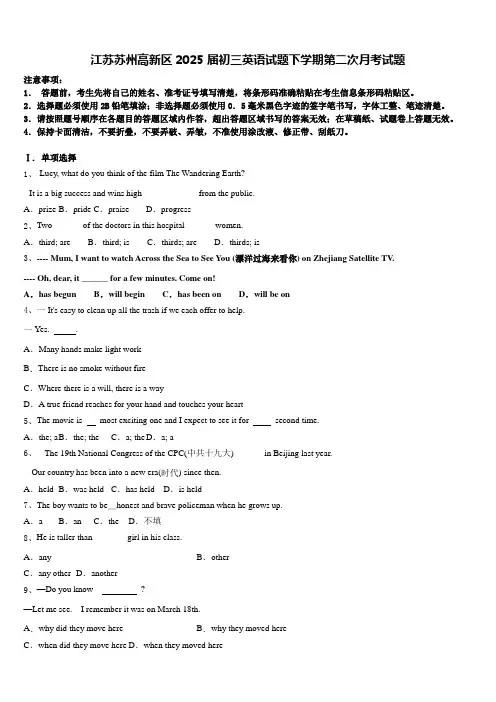
江苏苏州高新区2025届初三英语试题下学期第二次月考试题注意事项:1.答题前,考生先将自己的姓名、准考证号填写清楚,将条形码准确粘贴在考生信息条形码粘贴区。
2.选择题必须使用2B铅笔填涂;非选择题必须使用0.5毫米黑色字迹的签字笔书写,字体工整、笔迹清楚。
3.请按照题号顺序在各题目的答题区域内作答,超出答题区域书写的答案无效;在草稿纸、试题卷上答题无效。
4.保持卡面清洁,不要折叠,不要弄破、弄皱,不准使用涂改液、修正带、刮纸刀。
Ⅰ. 单项选择1、-Lucy, what do you think of the film The Wandering Earth?--It is a big success and wins high ____________ from the public.A.prize B.pride C.praise D.progress2、Two ______ of the doctors in this hospital ______ women.A.third; are B.third; is C.thirds; are D.thirds; is3、---- Mum, I want to watch Across the Sea to See You (漂洋过海来看你) on Zhejiang Satellite TV.---- Oh, dear, it ______ for a few minutes. Come on!A.has begun B.will begin C.has been on D.will be on4、一It's easy to clean up all the trash if we each offer to help.一Yes. .A.Many hands make light workB.There is no smoke without fireC.Where there is a will, there is a wayD.A true friend reaches for your hand and touches your heart5、The movie is most exciting one and I expect to see it for second time.A.the; a B.the; the C.a; the D.a; a6、-- The 19th National Congress of the CPC(中共十九大) ______ in Beijing last year.-- Our country has been into a new era(时代) since then.A.held B.was held C.has held D.is held7、The boy wants to be_honest and brave policeman when he grows up.A.a B.an C.the D.不填8、He is taller than _______ girl in his class.A.any B.otherC.any other D.another9、—Do you know ?—Let me see. I remember it was on March 18th.A.why did they move here B.why they moved here10、As a teen, I think we learn to take good care of ourselves in life.A.may B.must C.needn’tⅡ. 完形填空11、Have you ever met this situation ?You have a ticket for an 1 film which you want to see very much,but unluckily,you will have to 2 for an examination tomorrow .what will you do ?To see the film or study for the exam tonight ?If you 3 seeing the film and work hard at your lesson,we will say, you have self-control.Self-control is not 4 you have from birth.It needs cultivating(培养)in your life Sometimes you are attracted by One of the stories that are not very meaningful or useful to you .You must 5 your time well.You should n’t spend your time reading such kind 0f book or you will feel 6 afterwards.Do not go to bed late 7 a nice TV film,or you will go late to school the next morning . you 8 stay in bed too late at weekends either ,for it is a waste of valuable time. Every one of us has some 9 .A few of them might Keep us from 10 in life.Then we must use our self-control to become free of(消灭)them.Remember ,as a student,it is surely necessary to cultivate strong self-control!1.A.amazed B.boring C.interesting D.wonderful2.A.ask B.prepare C.go D.look3.A.feel like B.worry about C.give up D.go on4.A.something B.nothing C.anything D.everything5.A.waste B.manage C.take D.change6.A.sorry B.sick C.nervous D.happy7.A.because B.instead of C.if D.because of8.A.ought to B.had better not C.would rather D.may not9.A.thoughts B.games C.suggestions D.habits10.A.making progress B.making mistakes C.being happy D.showing onⅢ. 语法填空12、Many students have hobbies, such as reading, painting, growing vegetables in their gardens, and looking 1.animals. Some hobbies are relaxing and others are creative(有创造性的). Hobbies can make you 2.(grow) as a person,develop your interests and help you learn new skills.David Smith is a student. His hobby is writing. 3.the summer of 2000, he spent four weeks on a summer camp. As well as the usual activities, such 4.sailing, climbing and mounting biking, there was a writing workshop with a profession writer. “She asked us 5.(imagine) that we were in a story. Then we wrote about our experiences at the camp.”In senior high school David 6.a story about teenage life. Many teenagers love his book, and as a result, David has become aDavid has been very lucky8.his hobby has brought him enjoyment and success to 9.(he). But he is also interested in many other thing s. “I like playing volleyball, too.” says David. “I spend some of my free tim e 10.volleyball for my school team. Maybe I’ll write more books in the future, but I’m not sure.”There are many other interesting things to do in life, and we should try to do something new or different.Ⅳ. 阅读理解A13、As a parent, it's necessary to know how to best support your child in school. Today we'll talk about how you can support your child.1) Your child will be tired. The new school year means a while new schedule(进度表), so with the period may come a bit of fatigue.You should· Make sure your child get enough sleep.· prepare and pack in the evening for the next day of school.2) Your child may feel nervous. Everything is new! Everything is different!You should· Talk, talk, talk! Ask about the day and ask how he is feeling.· Know your child. Maybe he needs a bit of time after school and wants to talk in the evening, or maybe he's tired in the evening and wants to chat after school. Find it out an follow!3) Your child wants to do well. He really does. Remember that no matter what last year looked like, this year is a fresh and new start!You sho uld· Make it clear that you want to help him.· Celebrate successes!4) Your child really needs you. No matter what he says, your child needs you.You should· Be there when he needs you.· Know what is going on. Know what your child needs for class and get it for him.1.What does the underlined word "fatigue" mean in Chinese ?A.疲倦B.亢奋C.尴尬D.孤独2.What should parents do if their child feels nervous ?A.Tell him to get enough sleep. B.Have a relaxing chat with Mm.3.What can be the best title for the passage ?A.Learn to let go B.Schoolchildren are not easyC.Problems of schoolchildren D., Ways to support schoolchildren4.We can probably find the reading in a (n) magazine.A.travel B.business C.education D.sports5.Who might be interested in this reading ?A.Students. B.Parents. C.Teachers. D.Doctors.B14、Three Things to Do Before You Are 181.How many kinds of water sports are mentioned except swimming? A.Two. B.Three. C.Four. D.Five. 2.Which is NOT the advantage of team sports?A.To save your life. B.To keep fit.C.To make you happy. D.To think of others.3The writer write this passage for_______.A.The old. B.Women.C.Adults. D.The teenagers.C15、Molly Daniels opened the door so hard that the door nearly broke it. Then she looked through the window at her neighbor across the yard. “ She is in my garden again. Those are my strawberries, not hers. Maybe I should call the police.”Her friend, Doris, was sitting at the tab le with a cup of coffee in her hands. “You want to call the police because she picks your strawberries?” she asked.“Of course,” Molly answered angrily. “What would you do if your neighbor walked into your yard without your permission and picked your straw berries?”“I would say, better her than the bees.”“The bees don’t take my strawberries.”“But the birds do,” Doris continued. “That old lady only picks a few strawberries every year, and the only ones she picks are those you leave to the birds. Why don’t you pick some of your good strawberries and give them to her?”“Are you crazy? What are you thinking?’“Don’t you remember what happened when you were in hospital last year? She went to see you and gave you a pot full of chicken soup. When you give her the strawberries you can tell her that you still remember that.”Molly was____. She had almost forgotten that little kindness because she was too angry. Then she picked a basket of good strawberries and went out. Through the window, Doris could see that the a nger on Molly’s face changed into a bright smile. 1.Molly opened the door very hard because _____A.she was very angryB.she was very happyC.Doris wasn’t friendly2.Who was in hospital last year?A.Doris B.Molly C.Molly’s neighbor3.The underline word “shocked” in the passage means “_____”.A.angry B.surprised C.upset4.Which sentence is similar to the sentence “I would say, better her than the bees.”?A.It’s better to let the neighbor pick the strawberries than to give them to the bees.B.The bees are better than the neighbor.C.The bees like strawberries more than the neighbor does.5.From the last paragraph, we can infer(推断)what Molly did at last with a basket of good strawberries.A.She called the police to drive the neighbor away.B.She happily gave a basket of good strawberries to the neighbor.C.She ate up the strawberries herself.D16、Rome, Paris and New York are the world's top fashion cities, all of which have produced some of the top trends, form high-low skirts to the hottest new shoes. However, have you ever wondered the negative(消极的)ideas that they've broughtIn April 2016, the Advertising Standard Authority(ASA) in Britain stopped an ad from Gucci that has models dancing around and having fun, because the models in the ad were all quite thin. (Gucci, a famous brand(品牌)in the fashion industry and the company in question, said, "It was a personal idea as to whether a model looked unhealthily thin." It isn't new to us. The ASA stopped an ad in the year 2015 for the same reason. In France, it has been ruled that models are to provide a doctor's note which could prove that they are at a healthy weight.This brings up the question of weight, a hot topic for some people. What is the healthy weight for models? While I couldn't find an exact number, I did find this. According to ABC News, "Twenty years ago, the average(平均)fashion model weighed 8 percent less than the average woman. Today, she weighs 23 percent less." This is worrying. When has it ever been okay for anyone, models included, to weigh less than the average?People may think that being at an unhealthy weight will help him have the advantages that the models do. This provides a standard of beauty, and therefore people who want to achieve those things may try to do this through unhealthy ways. People may also think that they are overweight, compared to the images(形象)of models' thin bodies. They see something wrong with their bodies, whether they are overweight or not. This may make people feel bad, unconfident about their bodies. Sometimes people may have eating problems.I'm not blaming(指责)the fashion industry. It's not their fault(错误)that many people look up to the models and expect to live a life like their. I am glad that the ASA is raising its voices when discussing the growing problem of body image in the fashion industry. By stopping the photos and videos, speaking out against them and pushing for doctors' notes from the videos, it's pushing for the idea that the traditional fashion industry's body image standard should be changed and something more needy to be questioned.1.What does Gucci mean by what it says?A.Gucci has the right to choose models they like.B.Gucci has lost a lot of money.C.Gucci feels sorry for not choosing the right models.D.Gucci shouldn't be blamed as there're no exact weight standards.2.The numbers mentioned in Paragraph 3 show that .A.people don't know why models weigh lessB.many women are eating less to become thinnerC.weight problems of the models are more seriousD.being too thin causes health problems to models3.What does the fourth paragraph mainly talk about?A.The advantages of having a thin figure.B.The bad influence of models' thin images.C.The methods for having a good image.D.People's thoughts towards models' images.4.What's the possible purpose of the ASA′s measures(措施)?A.To improve the working conditions models are traced with.B.To set new standard of model's body imageC.To make people have a proper idea of body image.D.To keep us the good tradition in the fashion industry.E17、If you go to an American middle school on Wednesday morning, you will hear kids talking about the American idol(美国偶像)show from the night before. Some have called it the most influential show in the history of television.American Idol has been extremely successful in the country since 2002. The show was number one for six years! The most popular episode(剧集)had nearly 38 millionviewers. But why is the show so popular?The idea of the show is this: everyday people get a chance to show their singing talents to the world and become an “American Idol”, a famous pop star. Anyone in the country(between the ages of 15 and 28) can have a try—a chance of becoming world famous.In fact, everyday people are the ones who are allowed on the show. If you are a professional singer—you cannot be an American Idol. The winners are regular people from small towns—people who sang in churches or bars(酒吧)but had bigger dreams.The winners of the contest don’t get a prize of money. Instead, they get to record an album. Famous stars such as Kelly Clarkson and Carrie Underwood gained fame(获得名声) from winning the show. So, it seems the contest really works.It is the idea that anyone can be a super star that draws people to this program. All those hours of practicing in front of the mirror could lead to fame and fortune(财富).Even you could be the next “American Idol”.根据材料内容选择最佳答案,将其标号填入题前括号内。
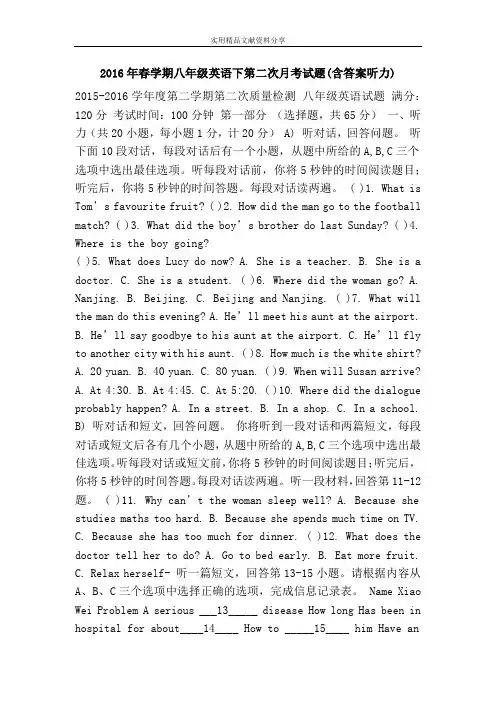
2016年春学期八年级英语下第二次月考试题(含答案听力) 2015-2016学年度第二学期第二次质量检测八年级英语试题满分:120分考试时间:100分钟第一部分(选择题,共65分)一、听力(共20小题,每小题1分,计20分) A) 听对话,回答问题。
听下面10段对话,每段对话后有一个小题,从题中所给的A,B,C三个选项中选出最佳选项。
听每段对话前,你将5秒钟的时间阅读题目;听完后,你将5秒钟的时间答题。
每段对话读两遍。
( )1. What is Tom’s favourite fruit?( )2. How did the man go to the football match? ( )3. What did the boy’s brother do last Sunday? ( )4. Where is the boy going?( )5. What does Lucy do now? A. She is a teacher. B. She is a doctor. C. She is a student. ( )6. Where did the woman go? A. Nanjing. B. Beijing. C. Beijing and Nanjing. ( )7. What will the man do this evening? A. He’ll meet his aunt at the airport.B. He’ll say goodbye to his aunt at the airport.C. He’ll fly to another city with his aunt. ( )8. How much is the white shirt?A. 20 yuan.B. 40 yuan.C. 80 yuan. ( )9. When will Susan arrive?A. At 4:30.B. At 4:45.C. At 5:20. ( )10. Where did the dialogue probably happen? A. In a street. B. In a shop. C. In a school.B) 听对话和短文,回答问题。
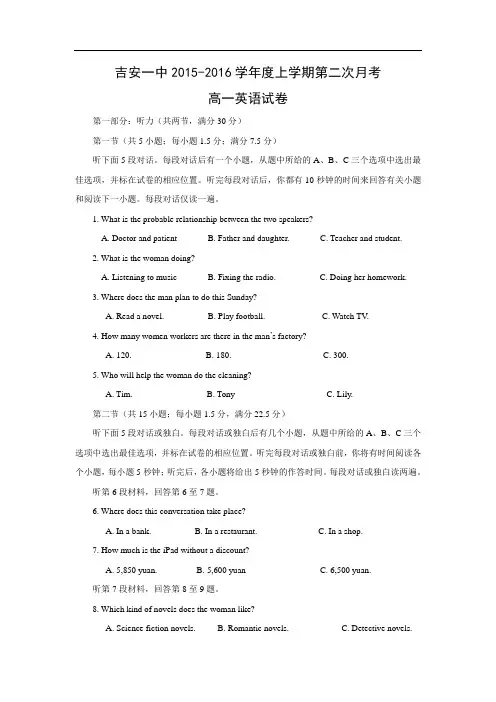
吉安一中2015-2016学年度上学期第二次月考高一英语试卷第一部分:听力(共两节,满分30分)第一节(共5小题;每小题1.5分;满分7.5分)听下面5段对话。
每段对话后有一个小题,从题中所给的A、B、C三个选项中选出最佳选项,并标在试卷的相应位置。
听完每段对话后,你都有10秒钟的时间来回答有关小题和阅读下一小题。
每段对话仅读一遍。
1. What is the probable relationship between the two speakers?A. Doctor and patientB. Father and daughter.C. Teacher and student.2. What is the woman doing?A. Listening to musicB. Fixing the radio.C. Doing her homework.3. Where does the man plan to do this Sunday?A. Read a novel.B. Play football.C. Watch TV.4. How many women workers are there in the man’s factory?A. 120.B. 180.C. 300.5. Who will help the woman do the cleaning?A. Tim.B. TonyC. Lily.第二节(共15小题;每小题1.5分,满分22.5分)听下面5段对话或独白。
每段对话或独白后有几个小题,从题中所给的A、B、C三个选项中选出最佳选项,并标在试卷的相应位置。
听完每段对话或独白前,你将有时间阅读各个小题,每小题5秒钟;听完后,各小题将给出5秒钟的作答时间。
每段对话或独白读两遍。
听第6段材料,回答第6至7题。
6. Where does this conversation take place?A. In a bank.B. In a restaurant.C. In a shop.7. How much is the iPad without a discount?A. 5,850 yuan.B. 5,600 yuanC. 6,500 yuan.听第7段材料,回答第8至9题。
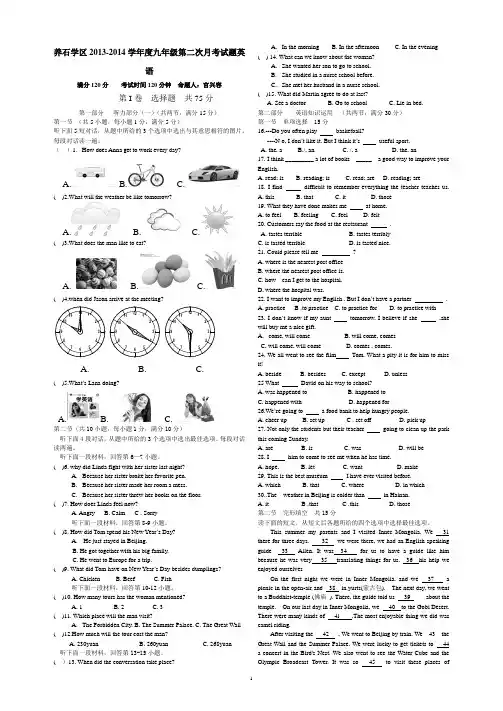
养石学区2013-2014学年度九年级第二次月考试题英语满分120分考试时间120分钟命题人:官兴容第I卷选择题共75分第一部分听力部分(一)(共两节,满分15分)第一节(共5小题,每小题1分,满分5分)听下面5短对话,从题中所给的3个选项中选出与其意思相符的图片。
每段对话读一遍。
()1.How does Anna get to work every day?A.B.C.( )2.What will the weather be like tomorrow?A.B.C.( )3.What does the man like to eat?A.B.C.( )4.when did Jason arrive at the meeting?A. B. C.( )5.What’s Lana doing?A. B. C.第二节(共10小题,每小题1分,满分10分)听下面4段对话,从题中所给的3个选项中选出最佳选项。
每段对话读两遍。
听下面一段材料,回答第6—7小题。
( )6. why did Linda fight with her sister last night?A.Because her sister broke her favorite pen.B.Because her sister made her room a mess.C.Because her sister threw her books on the floor.( )7. How does Linda feel now?A. AngryB. Calm C . Sorry听下面一段材料,回答第8-9小题。
( )8. How did Tom spend his New Year’s Day?A.He just stayed in Beijing.B. He got together with his big family.C. He went to Europe for a trip.( )9. What did Tom have on New Year’s Day besides dumplings?A. ChickenB. BeefC. Fish听下面一段材料,回答第10-12小题。
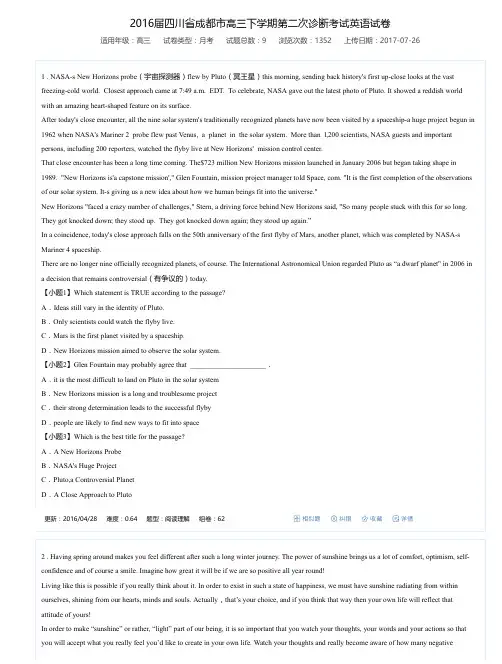
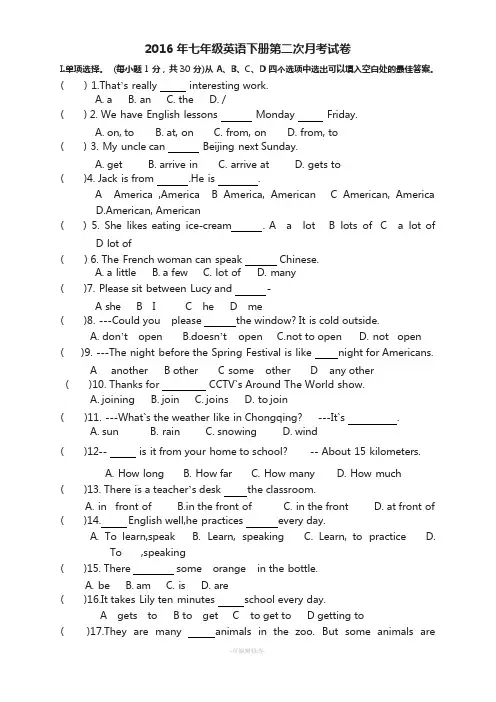
2016 年七年级英语下册第二次月考试卷I.单项选择。
(每小题 1 分,共 30 分)从 A、B、C、D 四个选项中选出可以填入空白处的最佳答案。
( ) 1.That’s really interesting work.A. aB. anC. theD. /( ) 2. We have English lessons Monday Friday.A. on, toB. at, onC. from, onD. from, to( ) 3. My uncle can Beijing next Sunday.A. getB. arrive inC. arrive atD. gets to( )4. Jack is from .He is .A America ,AmericaB America, AmericanC American, AmericaD.American, American( ) 5. She likes eating ice-cream . A a lot B lots of C a lot ofD lot of( ) 6. The French woman can speak Chinese.A. a littleB. a fewC. lot ofD. many( )7. Please sit between Lucy and -A sheB IC heD me( )8. ---Could you please t he window? It is cold outside.A. don’t openB.doesn’t openC.not to openD. not open ( )9. ---The night before the Spring Festival is like n ight for Americans.A anotherB otherC some otherD any other( )10. Thanks for CCTV`s Around The World show.A. joiningB. joinC. joinsD. to join( )11. ---What`s the weather like in Chongqing? ---It`s .A. sunB. rainC. snowingD. wind( )12-- is it from your home to school? -- About 15 kilometers.A. How longB. How farC. How manyD. How much( )13. There is a teacher’s desk t he classroom.A. in front ofB.in the front ofC. in the frontD. at front of ( )14. English well,he practices e very day.A. To learn,speakB. Learn, speakingC. Learn, to practiceD.To ,speaking( )15. There some orange in the bottle.A. beB. amC. isD. are( )16.It takes Lily ten minutes s chool every day.A gets toB to getC to get toD getting to( )17.They are many a nimals in the zoo. But some animals ares cary.A kinds of, kind ofB kinds of, kinds ofC kind of, kind ofD kind of , kinds of( )18. The students often games after school. They volleyball now.A. play, playB. play, are playingC. plays, are playingD. are playing, play( )19. On weekends, I watch TV play computer games.A. either, andB. either, orC. both, ofD. both, or( )20. We want a P.E teacher soccer in our school.A. teachesB. teachC. to teachD. teaching( )21.Alice is girl.A. an 11-year -oldB. an 12 year oldC. a 11-years-oldD. a 12years old( )22 Li Lin usually goes to school .A. rides his bikeB. by the busC. takes the trainD. on foot. ( )23. . Mary want to know ?A. Bob lives whereB. where Bob livesC. Where does Bob liveD. Bob where lives( )24.We need to brush our teeth after s upper to have good teeth.A eatB to eatC eatingD eatting( )25. . At school, boys must their hair short.A. takeB. bringC. getD. keep.( )26.Is there a post office near your school ? .The post office is far away from my schoolA Yes , it is.B No ,it isn’t.C Yes, there is.D No, thereisn’t( )27.I a lot of time reading books.A costB spendC takeD pay( )28.It sounds like is having a goodtimeA heB himC hisD her( )29.How long i t h er to go to school every day ?A do ,takeB does, takeC do,takesD does,takes( )30 I can still remember the actor f unny glasses.He is Molly.A wearB inC onD withII. 阅读理解。
九年级英语试题(考试时间: 120分钟试卷分值: 150分)一、听力部分:(共30分)第一部分听对话回答问题(共10小题;每小题1分,满分10分)本部分共有10道小题,每小题你将听到一段对话,每段对话听两遍。
在听每段对话前,你将有5秒钟的时间阅读题目;听完后,你还有5秒钟的时间选择你认为最合适的备选答案。
在听到“嘀”的信号后,进入下一小题。
1.What sign are they talking about ?A. B. C.2.What does the woman have for her lunch now?A. B. C.3. What is the girl doing?A. B. C.4. What is the man looking for?A. B. C.5. What will Peter most probably do in the future?A. An accountant.B. A teacher.C. A singer.6. What skills have been improved through the conversations with friends?A. Reading skills.B. Speaking skills.C. Writing skills.7. What is the girl’s suggestion for the boy?A. Eat less and exercise more.B. Drink more water.C. Get more sleep.8. Who is Daniel's hero?A. Yao Ming.B. Liu Xiang.C. His father.9. Why was Jack late for the opera?A. Because he forgot the time.B. Because he took the underground.C. Because there was too much traffic.10. How many children are there on the playground?A. 4B. 7C. 10第二部分听对话和短文答题(共10小题;每小题2分,满分20分)你将听到一段对话和两篇短文,各听两遍。
宿迁市钟吾初级中学2022-2023学年九年级上学期第二次月考英语试题二、单项选择(共15小题;每小题1分,满分15分)1.(1分)When he was________university student,he published his first volume of poetry.()A.a B.an C.the D./2.(1分)﹣﹣What was the ____________of the car accident?﹣﹣The driver drove too fast so the car was out of control()A.problem B.cause C.result D.purpose3.(1分)Jane Austen,the writer of Pride and Prejudice,wrote many stories of love.But she______single all her life.A.reminded B.remained C.realized D.required4.(1分)At first,Spud Webb was refused by the coach.Then________hard work,he got the scholarship from North Carolina State University.()A.through B.at C.on D.though5.(1分)The reporter could ______imagine how such an old man was able to climb the highest mountain in England.()A.simply B.hardly C.suddenly D.correctly6.(1分)—Sir,when can we go out to play badminton?—You can do it as soon as your task_________.()A.completes B.is completedC.will be completed D.will complete7.(1分)—When shall we go on a trip to Zaohe Longyun City,this week or next week?一________is OK.You decide.()A.Neither B.Every C.Either D.Each8.(1分)一He always_________to read books till midnight.一Oh,he is a top student.If he is not in the library,he is sure to be on the way.()A.gives up B.picks up C.stays up D.puts up9.(1分)—I want to have my bike __________.一Let us get the man over there __________you.()A.repair;to help B.repairing;helpC.repaired;to help D.to repair;helps10.(1分)一What do you think of the film Song of Spring?一It's very moving.It's worth _________ second time.()A.to watch B.to be watchedC.being watch D.watching11.(1分)—Will Helen come to our company tomorrow afternoon?—I am sure________ she will come,but I don't know_________ or not she'll take part in our project.()A.if;whether B.if;ifC.that;if D.that;whether12.(1分)_________great progress you have made this term! —lt's very kind of you to say so.()A.What B.How C.what a D.How a13.(1分)Why not ______ your teacher for advice when you don't know ______ the problems?()A.ask;what to do withB.to ask;how to deal withC.ask;what to deal withD.to ask;how to do with14.(1分)I really wonder__________.()A.how can I improve my EnglishB.which dress should I wear tonightC.who I can talk about the projectD.why he was late this morning15.(1分)﹣Thank you for giving me so much practical advice.﹣.Keep trying and you are sure to be successful.()A.It depends B.I didn't mean itC.Don't mention it D.I can't agree more三、完形填空16.(15分)A woman was at an airport waiting to board her flight.She still had a lot of(1),so she went to a shop and bought a book to read.(2)she was in the shop,she decided to buy a bag of cookies as(3).She(4)at her gate,sat down and started reading her book.She was so focused on her book that she didn't(5)what was going on around her.But she did see that a man had sat down next to her and taken one of her cookies out of the bag.She pretended (假装)not to notice,as she didn't want to make a scene.But then the man took more.He kept eating the cookies (6)there was just one left.The man tookthe last cookie and(7)it in half.He tapped (轻拍)the woman on the shoulder and (8)one half to her.The woman could not believe that someone would(9)all of her cookies and then offer half a cookie in return.She(10)grabbed (夺取)the half﹣cookie out of his hand and ate it without any words.Finally,it was time for her to board.But as she went to the gate,she(11)that her bag of cookies was still in her purse.The man had been eating his(12)cookies the whole time and simply wanted to share the last one with her.The woman blushed (脸红了).She sincerely wanted to(13)to the man for her rudeness.When we're not paying attention to the world around us,it can be easy to(14)what's happening or even become angry with others.It is better to keep our eyes open and think about every(15)when trying to understand a particular situation.(1)A.seats B.money C.tasks D.time(2)A.While B.If C.Since D.Although(3)A.nice B.well C.good D.soon(4)A.arrived B.reached C.got D.returned(5)A.believe B.worry C.notice D.forget(6)A.during B.until C.after D.unless(7)A.broke B.C.dropped D.changed(8)A.put out B.carried out C.held out D.found out(9)A.borrow B.steal C.bring D.buy(10)A.happily B.sadly C.excitedly D.angrily(11)A.realized B.understood C.knew D.aware(12)A.half B.self C.last D.own(13)A.apologize B.thank C.offer D.prove(14)A.reflect B.learn C.misunderstand D.consider(15)A.memory B.possibility C.necessity D.requirement四、阅读理解(共两节,满分30分)第一节阅读下列短文,选出最佳选项。
2016级初三毕业班第二学月检测英语试题第一卷选择题共100分第一部分听力部分(共三节,满分35分)第一节(共5小题,各小题1.5分,满分7.5分)听下面5段对话,每段对话后有一个小题,从题中所给的A、B、C三个选项中选出最佳选项。
每段对话读两遍。
( )1. How are thrillers in Ted’s eyes?A. Tiring.B. Scary.C. Exciting.( )2. How does Sam feel about the test?A. He hopes to take the test as early as possible.B. He is very worried about it .C.He feels upset.( )3. What will make Simon decide to buy the product?A. The well-made ad.B. The low price.C. The beautiful shape.( )4.Where does Rick’s uncle live?A. Near the sea.B. On the farm .C. In the city.( )5.What is Bai Xiang?A. An animal.B. A place. C A brand.第二节(共10小题,每小题1.5分,满分15分)听下面3段对话。
每段对话后有几个小题,从题中所给的A、B、C三个选项中选出最佳选项。
每段对话读两遍。
听第6段材料,回答第6至第8三个小题。
( )6.What does the boy find?A. A coat.B. A notebook.C. A basketball. ( )7. Where does the girl guess Sam is?A.In the library.B.In the classroomC. On the playground( )8.When does Sam have the English lesson ?A.On Thursday eveningB. On Friday afternoon.C.On Sunday morning听第7段材料,回答第9至第11三个小题。
( )9.Why did Jane cry?A. Because of horror.(恐怖)B.Because of her illness.C. Because of the work pressure ( )10. How did Bill feel when he saw Jane cry?A. He was sad.B. He was afraid .C. He felt annoyed.( )11. What should Bill do according to the woman?A.Tell Jane to give up.B.Make Jane happy.C.stay with Jane听第8段材料,回答第12至第15四个小题。
( )12.How does Mary tell what kind of person you are?A.According to the color you like best.B. According to the color you ofen wearC. According to the color you dislike most( )13.What color does Jeffery dislike most?A.Brown.B. PurpleC. Yellow( )14.According to Mary what kind of person is Kelly?A. She hopes others treat her like she does.B.She plans before doing things.C. She is a good speaker.( )15. Who is a good listener?A.Mary.B.Kelly.C.Jeffery.第三节共5个小题;每小题2.5分,满分12.5分听下面1段独白,独白后有5个小题,从题中所给的A、B、C三个选项中选出最佳选项。
独白读两遍。
( )16. Where did Wang Lin live forty years ago?A. In a small monutain village .B.In a village near a townC.In a small town ( )17.How far did the children have to walk to school every day in the old days?A. 8 kilomersB. 9 kilometers.C.10 kilometers.( )18. What did the children have to do after school in the old days?A.To do some cleaning .B. To milk the cows.C. To cut grass.( )19.How are people’s houses in the village now?A. Tall and bright.B.Nice and strong.C.New and comfortable.( )20. Where is the new school now?A. Near the town.B.Near a wide road.C. Near the village.第二部分基础知识运用(共20分)第一节单项选择(共10小题,每小题0.5分,满分5分)从各题所给的A、B、C、D四个选项中,选出可以填入题内空白处的最佳答案,并将其标号填入题前括号内。
( )21. . ______ beautiful these postcards are! Where did you get them?A. WhatB. What aC. HowD. How a( )22. Some sports, such as football and basketball, _______ a lot of teamwork, so in order to win the players need to work together.A. increaseB. supportC. requireD. create( )23. You may feel _______ surprising that such a little girl can speak three foreign languages.A. thisB. thatC. oneD. it( )24. Nick _______ football on Fridays but now he _______ it on Sundays.A. is used to playing; used to playB. is used to playing; is used to playingC. used to play; used to playD. used to play; is used to playing( )25. No matter _______ that famous singer goes, there are crowds of fans waiting to see him.A. whenB. whereC. howD. what( )26. —What happened to Sun Li’s brother?—He _______ because of drink-driving.A. is caughtB. catchesC. was caughtD. caught( )27. Mom is hard-working. _______ she does for the family, _______ she feels.A. The most; the happierB. The more; the happierC. The most; the happiestD. The more; the happiest( )28. —Eliza, can you tell me _______ to the new library?—Of course. I went there last Sunday.A. when did you goB. when you wentC. when will you goD. when you will go( )29. They can’t hardly avoid_______ products_____ in China.A. buy ….madeB. buying…madeC. buying…is madeD. to buy…made ( )30 —I've got a _______ to visit the National Stadium.—Really? Enjoy yourself!A. chanceB. secretC. requestD. choice第二节:完形填空(共15小题,每小题1分,满分15分)“Pedal(踩踏板), Jimmy!” said Judy. She was running along the road, holding onto her five-year-old brother’s 31 . Four years ago, Judy was Jimmy’s age, and she began to learn to ride. Now it was Jimmy’s turn, and Judy was very excited to be his 32 .“Don’t let go!” answered Jimmy. He 33 his head to make sure she was still there 34 Judy let go of the bike.Jimmy moved from side to side, shouted loudly, and 35 . He cried as he lay on the cold road. “I can’t do it!” he said.“Yes, you can. 36 to keep your balance (平衡). Watch the road ahead (在前面) —don’t keep turning around. Keep pedaling, Jimmy! One time, it’ll happen. I 37 .”Jimmy put his feet onto the pedals once more. 38 just a quick look at his sister, he set off again.“That’s it,” Judy told him encouragingly. “Keep pedaling.” Then she stopped 39 the bike, just as she had done fifty times before. He was five meters ahead of her, then ten meters, then fifteen. That was the 40 he’d ever gone!Jimmy looked straight ahead. The bike was going forward quickly. He was 41 ! When he rode right into bushes (灌木丛) and fell into them, he didn’t even cry.Judy ran to help him 42 . She saw a smile was spreading across 43 face. “I did it by myself!” he said excitedly.“ 44 !” said Judy. “Now you need to learn 45 to use the brakes (刹车)!”( )31. A. hand B. shirt C. arm D. bike( )32. A. neighbor B. sister C. doctor D. teacher ( )33. A. turned B. touched C. nodded D. hung ( )34. A. so B. if C. when D. or( )35. A. turned down B. fell down C. cut down D. wrote down ( )36. A. V olunteer B. Try C. Decide D. Plan ( )37. A. forget B. win C. promise D. agree ( )38. A. In B. For C. With D. Through ( )39. A. holding B. painting C. cleaning D. hitting ( )40. A. most quickly B. most easily C. earliest D. farthest ( )41. A. riding B. searching C. crying D. leading ( )42. A. below B. back C. inside D. up( )43. A. my B. your C. his D. her( )44. A. Good idea B. My pleasure C. Thanks D. Great ( )45. A. why B. how C. what D. where第三部分阅读理解(共20小题;每小题2分,满分40分)阅读下列短文,从每题所给的A、B、C、D四个选项中选出最佳选项,并在答题卡上将该项涂黑。